Interview by Anika Mukker
Translation by Kaylee Duval
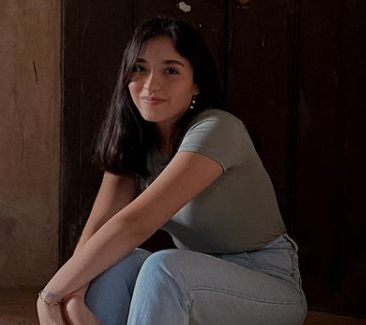

Since you are in university, what are you studying? Do you have an idea of what you would like to pursue in the future? Is there a specific reason why?
I really enjoy learning about the rights of indigenous communities. Here in Mexico, it is a big problem how these communities are often excluded. This does not only happen in Mexico, but also in the United States and many parts of the world where there are indigenous communities. They are excluded from everything, just as much in terms of rights as with international treaties, etc. That’s why I became interested in multicultural relations, because I want to do something regarding this issue as well as with my other work. I think they complement each other well.
I am still in my second year and don’t have what I want to do one hundred percent clear, but I would like to work advocating for the rights of indigenous communities.
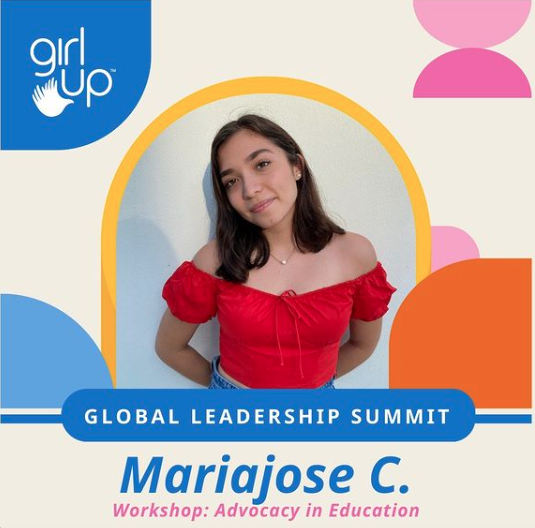
What actions can the government, the people that live in Mexico, and the people of different parts of the world take to create truly free and safe communities for women and children?
I think that the government, more than anything here in Mexico, would need to further women’s rights and rights of the minorities. This change is something that feminists fight so much for and, really, any person who advocates for human rights.
Equally from the government’s part, there’s a lot of corruption and many other internal issues that they don’t do much to resolve. To create safer cities in Mexico, they should work to resolve every issue and know what is necessary to do so, not, just putting more lights on the streets. Here in Cancun, they have already implemented some initiatives but it’s the government’s job to protect and promote the rights of women and minority communities.
Additionally, we can create safer communities and enhance security through education because when we start to educate everyone on these issues, we can start to eradicate these problems. It’s a combination of a bit of everything, but more than anything government participation has to start to meet the needs of people that are harmed by the inequality existing in Mexico.
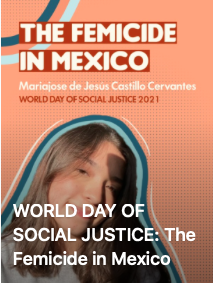
Building off of that idea, why is it important to use our voices to defend human rights, of women and children? How can we share our knowledge and experiences in public, intergenerational spaces although we are young?
I did not know the importance of sharing our own experiences and knowledge until I wrote the article with Assembly and saw the impact that my writing had. Many people came to talk to me, telling me things like “I didn’t even know this was happening.” I feel that the perspective of a person that is living with these issues is a lot different than reading about them in the news. Hearing these stories from someone who actually is living through these problems, I feel, is really powerful. We can also better understand, in the context of what they experience where they live. It is very important to pass along their voice in a way that is not too formal but also is something more like a conversation in which both parts grow as they fill with information. It’s important between people in our own community. In Mexico, and in many parts of the world, the MeToo movement began where many women began sharing their stories. For example, here in Cancun, we found out about many cases where girls were attacked or their rights were violated by boys of our school and generation. I think the movement gained so much prominence because it created a web of support to begin working towards fighting and eliminating the issue.
It was accessible, in that anyone could speak out or step up as long as they felt comfortable. I have friends who like to talk a lot about this topic, but are more timid and the most that they can do is share with people from their friend groups or similarly in a social media post. In fact, social media is very important to spread this information, to share these stories. It’s also important to have organizations like Assembly that provide platforms to girls to share what they want to say.
The truth is that I know I haven’t been through much, especially regarding this topic of gender inequality. I know that I have lived within my privileges, but I can use my voice to help those women who do not have the same privileges as me. What you are doing is very important because with what you can do, you help other women that can’t necessarily achieve the same feat alone, but through you they can gain a lot.
How can we support and amplify knowledge about indigenous neighborhoods and communities, specifically if we are not from these communities ourselves?
First would be to inform ourselves, and from here (or while doing so) would be to start a cultural exchange of knowledge, for example, creating an organization, foundation, or place like this where everyone is open to talk about these issues. The Mexican government honors Pueblos Magicos (magic neighborhoods) in every city, where the government conserves the area and helps this community. Tourists can arrive and learn more about different cultures and communities of Mexico. Through all this, we are able to educate tourists and foreigners about new cultures and new places. Through projects like these is where progress can be made.
In addition, you are part of the organization Stick to Change on Instagram. What is this platform? Why did you join this initiative? If you are part of other organizations, could you share a bit about what you do?
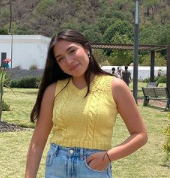
Stick to Change is a youth led organization where there are writers, designers, editors, etc. who talk about social injustices around the world. I’m a writer from Mexico, but I don’t necessarily have to talk about problems here in my country. I can talk about problems from any spot in the world, and, to be honest, writing has become very important to me. After immersing myself in writing, I realized that similar to how many people did not know about the problems in Mexico, I did not know about problems around the world. As a result, I became very interested in not only my country but also other cultures and problems that can occur worldwide. I love the organization and the idea that they have about how to inform about social injustice issues internationally.
Now in my school there are many student organizations that focus on anything and everything. I am currently part of a student organization called Trinchera that talks about a lot of gender issues. I really like it because we exchange many different perspectives. I think that until recently we perceived topics like machismo as something that only impacted women, not men, in movies or the idea of romance. By being part of these conversations, I am no longer a spectator. Ideas are expanded by this exchange, and I would like to write sometime about the issues that we discuss.
Just as you are passionate about writing, you also mentioned that you love to read. Why is reading so important, especially reading books with different perspectives? Do you have a favorite book that represents the value of widening your worldview through reading?
I will not have the exact, lived perspective of certain topics. For example, within Mexico, there are obviously different forms of feminism, and by reading I can understand more about these movements. I think I am a more relaxed feminist. Well, I don’t know how to explain it well, but when I read the perspectives of more radical feminists or feminists that are involved in ecofeminism, I can immerse myself in different ideas and mentally construct how another person is thinking. I think this is very important.
Reading opens you up to many worlds and many doors in which you can enter and discover “I like this” and “Ah, I don’t like this” to create your own perspective on something about the world or what you’re reading. There are many books that can provide different perspectives, and although they might not align with your own, these books can still broaden and further define what you think, redefining what you believe is correct and maybe even changing your ideas.
While I still do not have a favorite author, I would recommend this book called Sabias: La Cara Oculta De La Ciencia, which talks about women in science. It really broadened my perspective about how I don’t know many globally recognized scientists aside from those we learn in school. This book helped me learn more specifically about women that I didn’t know. Until opening this book, I didn’t even know half of the women in the book. The truth is that I believed that only Marie Curie and similar scientists were all the women in science. I think it’s vital to appreciate women just as much as men.
If you could give a piece of advice to yourself when you were a girl, what would you say?
I was very timid when I was very little. So, I think the greatest advice I would give myself would be that I should not be afraid to talk about topics that I am passionate about or that are uncomfortable.
Sometimes many people, myself included, remain silent, but it is important that we overcome this discomfort and talk about things we are passionate about or topics that don’t appear to be as “good” or palatable as others. Questioning ourselves is also very important. New movements stem from beginning to ask if things are good or bad, why things are the way they are. When I was younger, I was afraid of questioning something because I had the mentality that “these things are just this way and that’s it.” That’s why I would tell myself to not fear questioning things, questioning myself, and that if I felt like I didn’t know or understand something, to ask the teacher or my parents, not necessarily to tell them otherwise but to better understand the background as to why things are how they are.
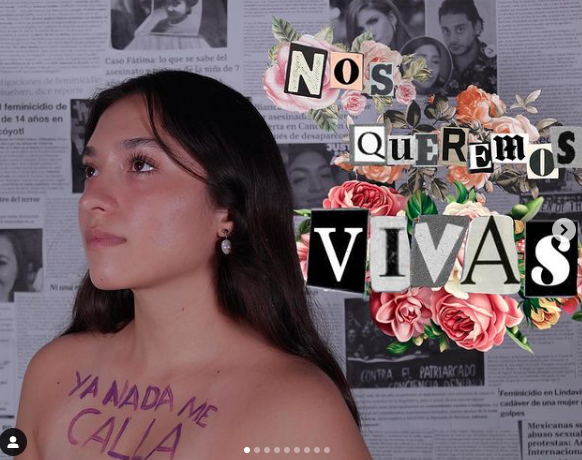
How has your community and background influenced the development of your passions to make a difference and participate in these projects, activities, and initiatives?
I have my sisters and am surrounded by women. The truth is that the majority of my friends are women, and I am also a woman. I have seen many of my sisters, my mother, my grandmothers, my aunts, or my friends suffer in one way or another from gender inequality or for the idea that we are perceived to be less for being girls. From here, I began to realize that there is a large issue that does not only affect me but also every woman around me and whom I live with.After recognizing the extent of the issue, I began to continue noticing more social inequality surrounding girls and boys. When I began to attend secondary school, or about seventh grade, I started to recognize more of these differences. Being surrounded by women influenced me a lot. There are more women in my life than men. That was what inspired me to talk about these topics and to become so passionate about gender equality.
What also influenced me was the many happenings in Cancun. The article that I wrote was partially prompted by a feminist march here in Cancun where there was police brutality. When the police arrived, I began to be surrounded by many additional issues. I knew that I had to speak and do something regarding these problems.
In feminist movements, how can we promote collaboration between women and girls to create change in our communities?
Opening platforms where women and girls can intermix and collaborate is one solution. We can open spaces where girls and women feel comfortable because it is not easy to always speak this way outside, publicly. Every person can feel comfortable with different things, and creating a group where we can have accepting, safe environments for every person to share their story is very important. These spaces would be really beneficial, and I think they are already starting to reshape ideas like rivalries between girls and between different age groups.
It’s already beginning to change, but it’s still important that we don’t perceive each other as competition and more so as sisters. We should see one another as a web of support, and we should create groups where we all are going to be comfortable to share our stories and perspectives.
Connect with Mariajose!
Instagram: @majoscott